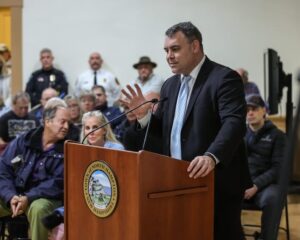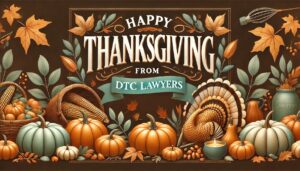
Angeljean Chiaramida
news@seacoastonline.com
NORTH HAMPTON — Residents spoke out Monday night for and against a petition that would have the town take privately-owned land by eminent domain to improve cellular service in North Hampton.
The Select Board is weighing whether to take a slice of Ron and Lori Cotter’s land at 168 Mill Road, against their will, for an easement so the town can construct an access road to reach town-owned land to install a cell tower.
The easement would provide a 25-foot permanent access road, taking an additional ten feet over an existing 15-foot Aquarion water easement, to get to the town’s land-locked parcel behind the Cotter’s home.
The Select Board made no decision Monday and continued the hearing until Feb. 2 at 7 p.m.
The Cotters weren’t able to be at the meeting, sending their attorney, Chris Hilson, to speak. Hilson challenged the legality in this case of the town’s use of the state’s eminent domain statute for access to a cell tower.
Previous story:North Hampton dead zone: Town may use eminent domain on homeowners’ land to add cell tower
Eminent domain gives the government the power to take private property, or in this case an easement on private property, even if the owner doesn’t want to sell, for a “public use” as long as the owners receive “just compensation.”
Hilson said eminent domain is for public use, not so the town can access a piece of land it intends to lease to a private company to erect a cell tower and earn money. That’s the town entering into private commerce, Hilson said, not meeting a public need itself. According to Hilson, that would make the town a “landlord for private commerce to make money.”
“It’s not a local municipality’s obligation to provide cell coverage,” he said. “That’s a federal mandate for the (private cell phone) carrier as a condition of their licenses. Under New Hampshire law you cannot condemn property (take by eminent domain) for private business purposes.”
The public hearing came as a result of a petition from 11 residents calling for the town to take the land by eminent domain. The need for a cell tower in North Hampton is long-standing and well-known.
None of those who attended Monday night’s public hearing disputed there are significant cell dead zones along parts of Route 1, Atlantic Avenue and at the beach. In those dead zones, it’s difficult if not impossible to make a cell phone call, even in emergencies.
Goals and visions:Hampton’s new police chief talks officer shortage, body cams and patrolling Hampton Beach
According to Fire Chief Jason Lajoie and Police Lt. James Russell, the lack of cell phone coverage in those areas constantly results in dropped calls during emergencies to hospitals, doctors and other safety agencies, as it did during a recent fatal car accident. The lack of service causes risks to the public when minutes count, they told the Select Board, something they see as a significant safety risk. They encouraged the Select Board to proceed with the eminent domain process.
The town’s cell tower consultant, David Maxson, highly recommended the land behind the Cotter’s property as the best tower placement for a number of reasons, including its location, height and remoteness and projected cell signal coverage.
Residents speak in support of petition
Several residents spoke in favor of the eminent domain taking.
Dr. Brian Hyett said he loses calls from his home because of failing cell service. As a doctor often called to perform life-saving procedures, he frequently doesn’t get emergency pages, he said, and his calls to the hospital are sometimes dropped.
“I have to leave my home to get reception,” said Hyett.
Hyett added as a father he worries about lack of cell service should his daughter have an emergency while she jogs around their home.
Valerie Gamache, who lives in the Atlantic Avenue dead zone area, said she witnessed her neighbor with Alzheimer’s disease struggle during a recent power outage. Gamache said he was in the middle of the road trying to flag down cars asking for help.
Related:Project to add 400 apartments, 34 townhouses and retail: What will it mean for Hampton?
“I’m just trying to live in my neighborhood and feel safe,” said Gamache, adding she was “sorry for anyone who’ll have any pains” as a result of the land taking.
Joe Constagna discussed the general importance of cell reception in today’s world.
“In this day and age … it’s quite embarrassing that we cannot get cell reception,” he said. “I can’t tell you how many hours I sit in my village square parking lot taking phone calls from my family because I can’t get cell reception at my house on Atlantic. I trust you all in the easement approach … I believe it’s that significant an issue.”
Many object to eminent domain taking
By and large, however, most in the room came to express their distaste for eminent domain, if not by speaking then at least by their applause when others condemned it.
Jim Avallon said to him eminent domain is only for direct public use projects, like public roadways, water pipes etc., “not for cell service.” Avallon said he was “extremely wary” of eminent domain, finding it “frightening.”
“It’s a tool of the powerful and influential,” he said. “I urge you to vote against it.”
James Nash said he “gets it,” cell service is the norm. But he wanted to see the reports that stipulate taking the Cotter property is the only and best available option.
“This will affect the integrity of Lori Cotter’s mother’s home,” he said. “The public should be able to see the results.”
Arthur Nadeau told the board he remembered when as a child his home in Berlin was taken by eminent domain. He experienced the demolishment of his home as a crushing blow, he said, adding this taking will run right beside the Cotter’s pool.
From the archives:Cell tower ruled out on school property
Kathleen Kilgore said 33 percent of North Hampton is owned by the town. She wanted an explanation on why other properties wouldn’t work, and that taking the Cotter’s land is the only option the board is pursuing.
“This is life-altering to this family; I ask you to think about that,” she told the board. “The town’s people need to think about this, too. It could be our land next.”
Wally Kilgore added that although he doesn’t know the Cotters he considers them his neighbors as residents of North Hampton.
“If they don’t want it, that’s good enough for me,” he said. “This is not the will of the people.”
Kirsten Larsen Schultz said the eminent domain taking is not as “clear cut,” as it’s being laid out by the board.
“I want cell service like everyone else, but there are a lot of smart people in this room and there has to be a better way to do it than by eminent domain,” she said, adding it’s easy to say since North Hampton needs cell service it’s fine to take a neighbor’s land.
“And I challenge anyone,” Schultz continued, “if you agree to this then I’m going to assume that you’re OK with an easement on your property.”
Are there any other options?
Mill Road resident John Cannon asked why the Select Board were considering eminent domain, instead of the use of other town land.
Larson Schultz asked if town-owned parcels off Shiprock Road and Squier Drive were considered as possible cell sites. According to the petition, two of the residents who signed the petition to take the Cotter property live on Squier Drive.
Select Board Chairman James Sununu said the board investigated all options for siting a cell tower on town land. He believes the easement across the Cotter’s land is the best option.
“We’ve looked at the town’s other properties and possible ways,” Sununu said. “We think this is the most efficient way and the most accessible.”
Others in the audience seemed doubtful, however, wanting to see the surveys and written reports on the board’s investigations of other properties. Sununu said there are no such reports.
 This Thanksgiving, we’re pausing to reflect on the relationships, trust, and collaboration that shape our work at Donahue, Tucker & Ciandella, PLLC.
This Thanksgiving, we’re pausing to reflect on the relationships, trust, and collaboration that shape our work at Donahue, Tucker & Ciandella, PLLC.


